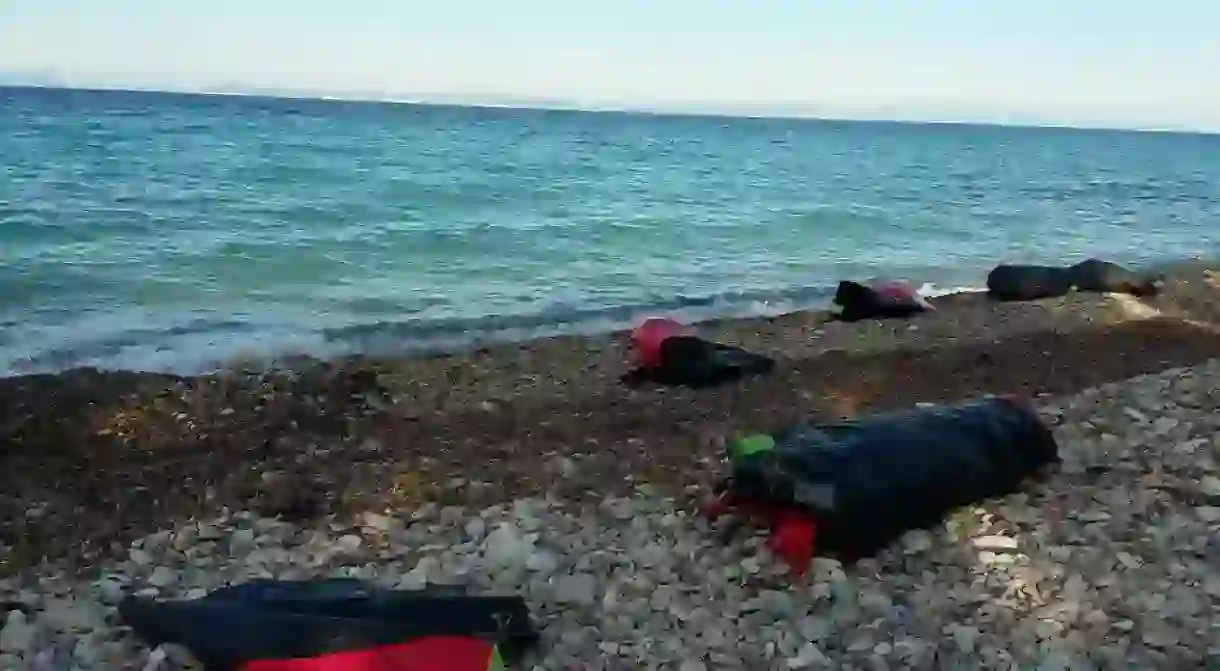Meet mimycri: the Berlin-Based NGO Upcycling Refugee Boats

Berlin-based non-profit mimycri brings together a diverse team of newcomers and Berliners to upcycle broken refugee boats into stylish, high-quality bags and backpacks. The inspiring project is a platform for integration and sustainability, helping to create jobs and recycle debris washed up on beaches. Here’s everything you need to know.
Background
The idea for mimycri was born in 2015 on the Greek island of Chios while its co-founders, Nora Azzaoui and Vera Günther, were volunteering to help refugees. “Vera and I worked at the beaches at the high time of refugee arrivals. After welcoming people at the shores we also cleaned the beaches from vests, dirty clothes and broken boats,” explains Nora.
While clearing away the debris and setting up recycling projects the pair had a shift in their outlook, “after installing a washing project to recycle the wet and dirty clothes, we couldn’t stop thinking about all the plastic waste at the beaches – this is when we had a change of perspective.” Nora and Vera starting thinking of new ways to reuse the plastic and rubber that would otherwise be thrown away: “we decided to see waste as a strong resource and see newcomers in Germany as individuals with talents that can become our colleagues,” says Nora.

The team
Upon returning to Berlin, Vera and Nora secured funding for their idea and set out to build their team, bringing together “a core team of five individuals from Syria, Pakistan, Iran and German,” explains Nora. Among them is Abid Ali, a lifelong tailor and newcomer from Pakistan, who first arrived in Europe on the shores of Greece. Now, he has found both a new life in Berlin and work through mimycri, “I have many reasons to love (the mimycri project), and a very big reason is that it also my personal history, I came with a rubber boat,” Abid explains. Lending his years of experience and skills, Abid is a vital part of the team: “stitching is my passion, it’s my profession: I have 22 years experience,” says Abid. However, the platform has helped him gain more than employment in Berlin, “I learned the German language here, working with my mimycri team and my German friends,” he says.
This exchange of skills is a testament to the collaborative nature of the team and it’s a working environment that the co-founders believe in, “for our work it is key to meet regularly each week and develop our work together,” Nora explains. The five-person team of Germans and newcomers work together on concept and design as they transform old dinghies collected by volunteers clearing beaches in Greece into the unique bags and backpacks. The rubber is a steady resource and is cleaned, packed and sent to Berlin, where the mimycri team upcycle the thick black and grey pieces into the sturdy backpacks, while the colourful inner tubes are repurposed into smaller clutches, fanny packs and pouches.

The product
The result is a distinctive, quality and high-end product that tells a story. “We see our bags as more than accessories – they tell a story a raised awareness for migration, integration and sustainability,” Nora explains. By upcycling materials that would otherwise be laid to waste, mimycri is able to give new life to the destroyed boats, while their small team is a picture of positive integration in Berlin. It’s a message that they want to spread with their project: “with our designs we try to raise the awareness for questions, such as what impact do our consumption patterns have? How is our behaviour linked to migration? Is it possible to do something on a personal level to contribute?” says Nora.

Their platform demonstrates a tangible way to embrace migration and the outcomes of the refugee arrivals, both on a personal and environmental level. As Nora explains, “mimycri addresses interlinked global challenges on a local level and we try to provide a creative approach that seems too complex on a global scale.” The project challenges people to shift their perspective and to rewrite the narrative.

The future
However, as Nora points out, the so-called refugee crisis still requires the public’s attention: “I think, the attention for the situation on the Greek islands has dropped even though support is desperately needed there: water supply in camps, education for children as well as the strengthening local communities.” Nora continues, “from a political point of view as well from an individual point of actions are absolutely necessary. With mimycri, we try to show that for each of us it is possible to act. We all have something to give – let it be an hour of your time per week as language buddy.”
The power to act locally and give back to our community is at the heart of mimycri. It’s an inspiring message, not to mention a perspective that motivated Vera and Nora to create their project and continue to strive to support, collaborate and build their community within Berlin.













